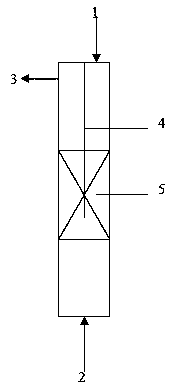Preparation method of tert-butyl phenol
A technology for p-tert-butylphenol and isobutylene, which is applied in the field of preparation of tert-butylphenol, can solve the problems of strong catalyst corrosion, complicated process and operation, low reaction conversion rate, etc., and achieves stable catalyst activity, simple process and improved The effect of conversion rate
- Summary
- Abstract
- Description
- Claims
- Application Information
AI Technical Summary
Problems solved by technology
Method used
Image
Examples
Embodiment 1
[0040] (1) Preparation of solid superacid catalyst: a: 50 grams of ZrOCl 2 Dissolved in ethanol to obtain a mass concentration of 25% ZrOCl 2 ethanol solution, and then 30 g TiCl 4 dissolved in ZrOCl 2 In the ethanol solution, titrate with 20% ammonia water until there is no white precipitate, wash with deionized water for 5 times, each time for 10 minutes, the washing temperature is 40°C, wash until there is no chloride ion, and then put it in a vacuum at 90°C Dried in a drying oven for 6 hours, extruded and then calcined at 500° C. for 8 hours to obtain white solid particles for use. b: impregnate the white particles obtained in step 1 with a silver nitrate sulfuric acid solution with a concentration of 2mol / L, the impregnation temperature is 55°C, and the impregnation time is 6h; the decompression vacuum degree is 15000Pa; the ultrasonic vibration frequency is 55kHz, and then the solid particles are placed at 90°C Dry it in a vacuum oven for 6 hours under the condition o...
Embodiment 2
[0043] (1) Preparation of solid superacid catalyst: a: 50 grams of ZrOCl 2 Dissolved in ethanol to obtain a mass concentration of 25% ZrOCl 2 ethanol solution, and then 35 g of TiCl 4 dissolved in ZrOCl 2 In the ethanol solution, titrate with 20% ammonia water until there is no white precipitate, wash with deionized water for 5 times, each time for 10 minutes, the washing temperature is 40°C, wash until there is no chloride ion, and then put it in a vacuum at 90°C Dried in a drying oven for 6 hours, extruded and then calcined at 500° C. for 8 hours to obtain white solid particles for use. b: impregnate the white particles obtained in step 1 with a silver nitrate sulfuric acid solution with a concentration of 2mol / L, the impregnation temperature is 55°C, and the impregnation time is 6h; the decompression vacuum degree is 16000Pa; the ultrasonic vibration frequency is 55kHz, and then the solid particles are placed at 90°C Dry it in a vacuum oven for 6 hours under the conditio...
Embodiment 3
[0046] (1) Preparation of solid superacid catalyst: a: 50 grams of ZrOCl 2 Dissolved in ethanol to obtain a mass concentration of 25% ZrOCl 2 ethanol solution, and then 35 g of TiCl 4 dissolved in ZrOCl 2 In the ethanol solution, titrate with 20% ammonia water until there is no white precipitate, wash with deionized water for 5 times, each time for 10 minutes, the washing temperature is 40°C, wash until there is no chloride ion, and then put it in a vacuum at 90°C Dried in a drying oven for 6 hours, extruded and then calcined at 500° C. for 8 hours to obtain white solid particles for use. b: impregnate the white particles obtained in step 1 with a silver nitrate sulfuric acid solution with a concentration of 2mol / L, the impregnation temperature is 58°C, and the impregnation time is 6h; the decompression vacuum degree is 18000Pa; the ultrasonic vibration frequency is 58kHz, and then the solid particles are placed at 90°C Dry it in a vacuum oven for 6 hours under the conditio...
PUM
 Login to View More
Login to View More Abstract
Description
Claims
Application Information
 Login to View More
Login to View More - R&D
- Intellectual Property
- Life Sciences
- Materials
- Tech Scout
- Unparalleled Data Quality
- Higher Quality Content
- 60% Fewer Hallucinations
Browse by: Latest US Patents, China's latest patents, Technical Efficacy Thesaurus, Application Domain, Technology Topic, Popular Technical Reports.
© 2025 PatSnap. All rights reserved.Legal|Privacy policy|Modern Slavery Act Transparency Statement|Sitemap|About US| Contact US: help@patsnap.com


